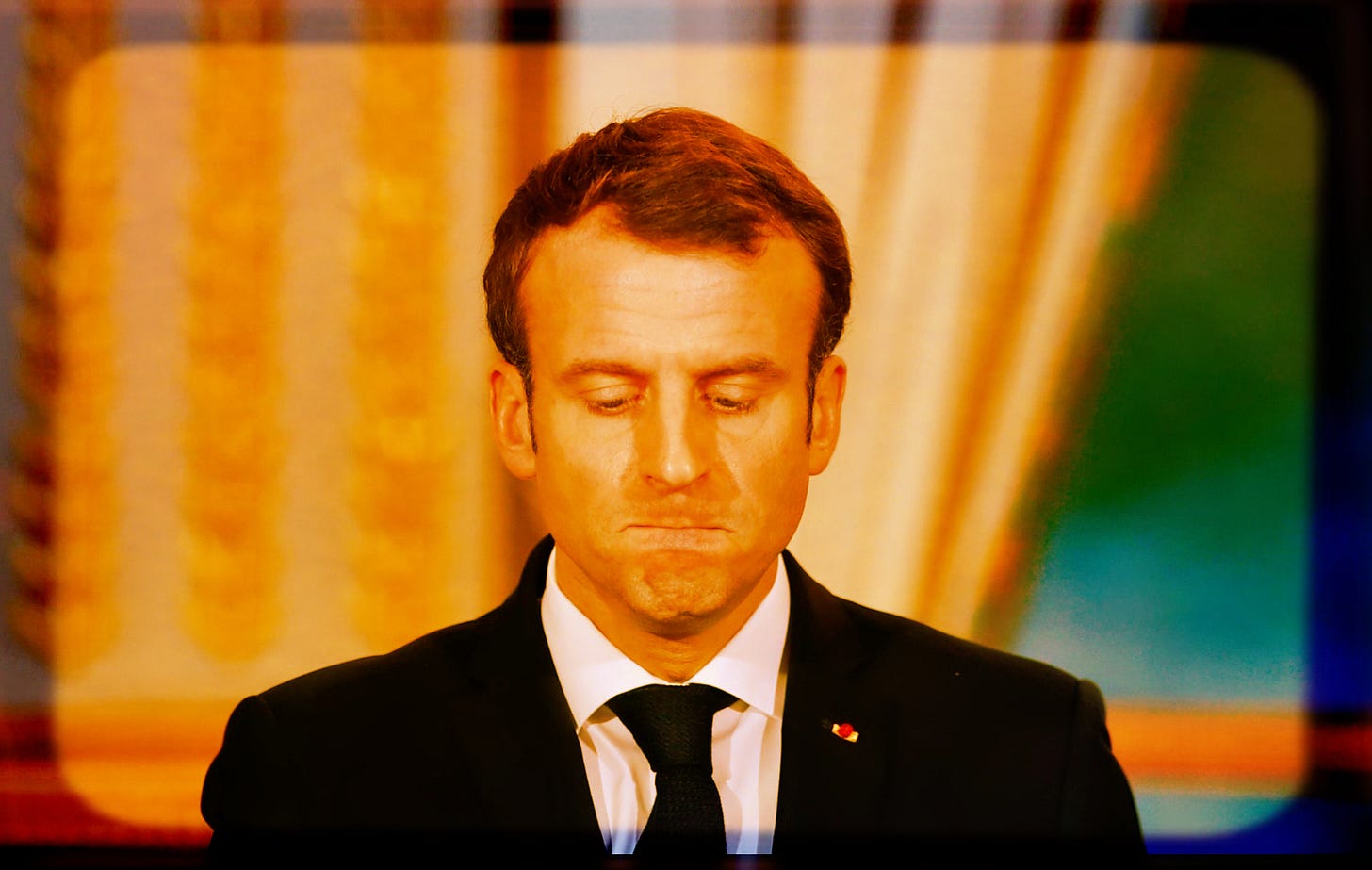Why Macron won't address Islam’s “crisis” in economic terms
France would rather fight a culture war than address its economic colonialism towards the Muslim world.
Last month, French President Emmanuel Macron announced that Islam was “in crisis.”
He proclaimed that France “must tackle...Islamist separatism,” which Macron defined as “a conscious, theorized, political-religious project materializing through repeated deviations from the Republic’s values, which is often reflected by the formation of a counter-society.”
“Secularism is the cement of a united France,” he said.
These forceful remarks were accompanied by a few new laws aiming to ban outward displays of religious affiliation in schools and “secularize” mosques by adding more layers of government oversight into their funding.
Macron drew the ire of much of the Muslim world at a time when tensions were already elevated since the Charlie Hebdo trial began in September. The satirical magazine republished the cartoons of the prophet Muhammad that spurred the 2015 terrorist attack, and a spate of violent incidents followed throughout France, including a knife attack outside Charlie Hebdo’s old headquarters and a schoolteacher beheaded in a class on free speech.
Meanwhile, massive anti-France rallies were held in the Arab world, alongside a boycott of French goods. Effigies in Macron’s likeness were burnt from Karachi to Doha, and Turkish President Erdogan suggested that Macron needed “mental treatment,” leading to a war of words images, with Charlie Hebdo’s artists taking up their pens to satirize the Turkish despot. The familiar ‘Islamist threat’ now dominates France’s headlines, even as COVID-19 rampages throughout the country.
In an interview with Al Jazeera, Macron added that there was no sense in stigmatizing all Muslim believers and said he “understand[s] the sentiments [of the Islamic world] being expressed and respect[s] them.” He framed his rhetoric as rooted in defense of freedom, free speech, and the core principles of laïcité.
His attempts to distinguish Islamist terrorists from Muslims, in general, is a welcome alternative to openly racist sewage that emerges from The National Rally party. But the mainstream discourse of the issue of so-called “Islamic separatism” tends to focus on “tolerance vs. intolerance” in the culture. The liberal media misses a materialist perspective on any long-term, strategic approach to France’s ongoing problems with the Muslim world.
There’s a reason why won’t Macron doesn’t frame Islam’s “crisis” in economic terms. France’s government has led a decades-long silent onslaught on many Muslim countries built around debt, servitude, and neocolonialism.
Many majority Muslim countries in Africa and the Middle East do not have the luxuries that EU countries have. Countries like Italy and Portugal still enjoy relatively stable economic conditions, while countries like Egypt and Angola do not.
Take Algeria, for example, where the public sector makes up a significant share of its economy, more than a third of the state’s revenue. Job creation is intertwined with the availability of liquid cash for the government. If there is an abundance of money circulating, in theory, more jobs can be created. But money is tight, especially when the ability to rely on oil revenues to shore up the public sector is increasingly no longer tenable.
Yet Algeria is one of fourteen African countries that pay France a total of about 500 billion dollars a year, and the contractual obligation goes back to the days when they were French colonies. Those western and central African countries use a French-backed currency known as the C.F.A. franc—(C.F.A. originally stood for “franc of the French Colonies of Africa”). In exchange for guaranteeing the money, France holds 50 percent of the foreign exchange reserves of the C.F.A. franc countries hostage in its treasury.
“It is as if these African nations are paying French banks to hold their money,” Ndongo Samba Sylla, a Senegalese development economist, told the New York Times.
One factor exacerbating this situation is private lenders’ enormous loans offered at high-interest rates to African governments. According to one estimate, between 2006 and 2017, African governments received $460 billion from “external lenders.” Nigeria alone also owes nearly $31 billion to the Paris Club, a cohort of rich lenders.
In 2019, Luigi Di Maio, an Italian deputy prime minister, accused France of “monetary imperialism” in Africa, driving migration to Europe.
The ensuring cycle of debt traps and dismal economic conditions in France’s former colonial countries worldwide are obstacles to generating strong democracies and one of the largest contributors to certain strains of radical Islam taking root.
What is desperately needed during the time of COVID-19 is for France and the IMF to cancel out all debt of the most impoverished countries.
Developing economies worldwide have taken a sizable beating during the virus crisis, one that won’t simply disappear if and when a vaccine is available. The damage accrued here will take years. Even a modest repayment scheme could push countries like South Africa and Ethiopia over the edge. A simple cancellation of payments cannot suffice— a cancellation of the debt must be on the table.
There are signs that this is not unthinkable, and the time of austerity is (hopefully) over. Back in April, the G20 announced a temporary moratorium of six months of debt payments for 25 of the world’s poorest countries, and the deficit-obsessed EU even signed off on a €750 million coronavirus relief plan.
Perhaps this is where Macron could step in. It’s possible to walk and chew bubble gum at the same time. Macron can condemn acts of violence from the Islamic extremists and emphasize mutual respect and tolerance while allowing larger parts of the Arab world to step into financial modernity.
The Islamic world is indeed in crisis, but it’s not due to a lack of secularism. Countries are saddled with debt, interest rates on borrowing remain high, jobs are scarce, and there is less room for fiscal maneuvering. What it needs now are concrete material solutions.


